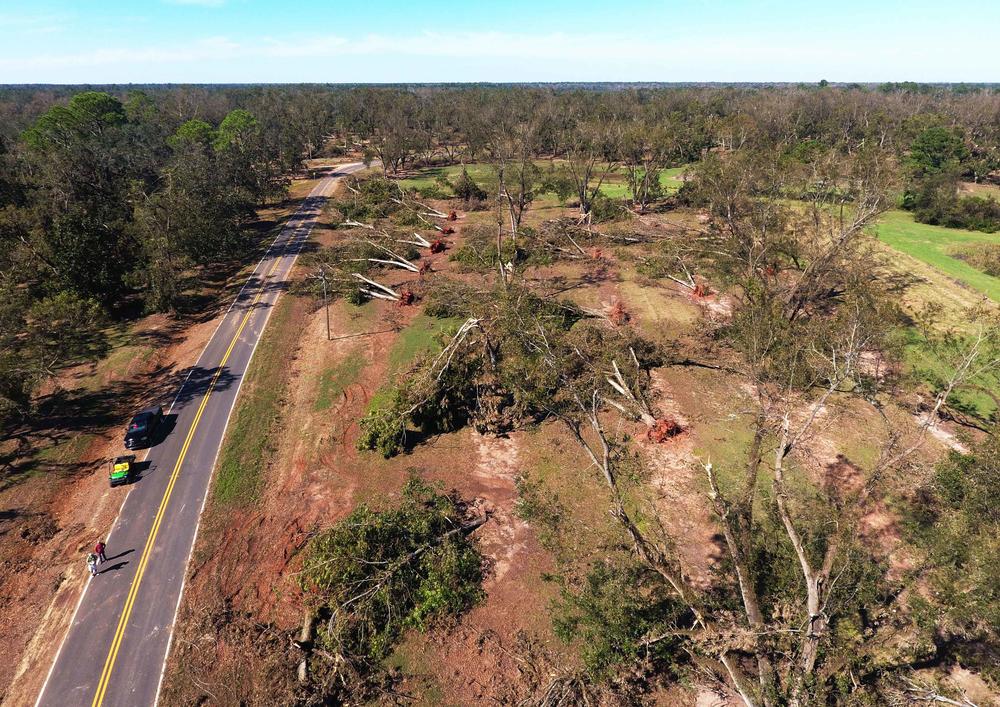Section Branding
Header Content
Rural Georgia Democrats Looking For Presidential Candidate That Represents Them During Debate
Primary Content
Of Georgia’s 159 counties, just over two dozen voted Democrat in last year’s gubernatorial election.
All of them are clustered around the major cities of Savannah, Athens, Macon, Albany, Augusta and Atlanta.
But rural Georgia has more Democrats than you’d think, says Laura Register.
The political consultant and Grady County School Board member will be watching Wednesday’s Democratic presidential debate with an eye toward which candidate would best serve rural Georgians.
Laura Register recently joined GPB's Rickey Bevington in the studio.
She started by painting a picture of what it’s like to drive four hours from one of the most rural parts of Georgia toward a city like Atlanta.
This conversation has been edited for clarity and conciseness.
Laura Register: We live south of town on a farm, and I come through town and then I come through the peanut and cotton fields and then I get on up to Albany, which is pecan trees. I hit the interstate, and then I start getting the Chick-fil-a's and the McDonald's and Starbucks and more and more people and traffic.
Rickey Bevington: Describe your community.
Register: The county seat is Cairo, and we are agricultural-based community. We have seven schools, one high school. We're known for our "Syrupmaker" band and football program. It's a really good community. We got hit by the hurricane and the tornado last year, so we've been struggling to bounce back from some of those occurrences.
Bevington: When you speak to rural Democrats, what are they looking for in the next president?
Register: They don't want Trump. We felt a lot of backlash from the policies of the Republicans. Our hospitals are really struggling because of the health care policies.
We're looking for a candidate who doesn't just say, "I care about rural." Prove it, you know, come and visit us. Talk about how you understand the rural needs for health care and education and disaster relief.
Bevington: Health care is a big issue. Talk about how access to health care has impacted rural Georgia.
Register: [It's] the closing of the hospitals. Certain communities don't even have physicians. You don't have access to emergency care if you're in an accident. Some people drive an hour away to find health care.
Bevington: Do you feel left out when politicians are stumping across the country and they don't come down to Grady County?
Register: They don't. After the hurricane came through, we had all the Republicans come down and see and walk the pecan groves. I mean, everybody from Trump and Pence to Perdue. But since the hurricane, we didn't have any Democrat come down.
Bevington: It sounds like you're saying that Republicans have a better relationship with rural Georgia.
Register: Well, we tend to be red. We are conservative, and so we elect Republicans. But I think that's going to change as Democrats become more and more aware of us and are not afraid to come down and see what's going on.
Bevington: By "us," you mean rural voters?
Register: Yes. The rural Democrat, the rural voter.
Bevington: You admit that Grady County is very likely to vote Republican in 2020. So what is your argument for drawing a Democratic candidate to your community or communities like yours where they think they're going to lose anyway?
Register: I just think it's important that they hear what's going on in rural Georgia, especially rural south Georgia. We're hit really hard by the tariffs. We're hit by the disasters. We really would like to see and hear other other candidates than just the Republicans. I mean, there are more Democrats down there than we realize, and after Trump's election, a lot of us became more and more vocal.
Bevington: What's it like to be a Democratic voter in a very red community?
Register: You learn to be very diplomatic. As you said earlier, I'm an elected school board member. 73% of my district voted for Trump, but they voted for me in a contested race. We have to know how to talk to each other, and I think that's one of the big things that I try to get across to our Democratic lawmakers is we've got to hear what's concerning to these people, whether they're going to vote for us or not.
I admire politicians and candidates who will come down. No, you're not going to raise a big chunk of change, but you're going to make some friends. You're going to find out something that you had no idea about.



